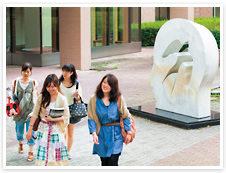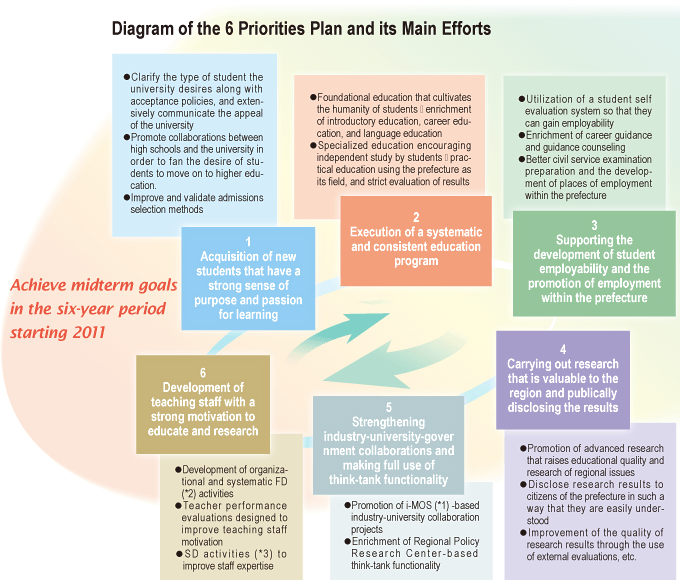- Striving to become a university that contributes to core human resources development
and the generation of vitality in the local community - Second Phase Midterm Goals
- The 6 Priorities Plan and University-wide Common Plan of the Second Phase Midterm Plan
- Issues to focus on in the 2012 academic year plan
- Featured Topic:
Regarding the establishment of the Center for the Planning of Higher Education (provisional name)
 The year 2012 is the second year of our second phase midterm goals period. The operations of Iwate Prefectural University follow an academic year plan, as well as 6-year medium-term objectives based on a medium-term plan spanning from 2011 to 2016.
The year 2012 is the second year of our second phase midterm goals period. The operations of Iwate Prefectural University follow an academic year plan, as well as 6-year medium-term objectives based on a medium-term plan spanning from 2011 to 2016.
Our midterm goals to strive to become a university that contributes to core human resource development and the generation of vitality in the local community are founded on two basic stances: education that puts students first, and research and regional contributions that generate vitality in Iwate.
The university is undertaking an approach to education, research and regional contribution based on 3 basic goals. Our educational goal is to strengthen our students’ ambition. We also want to be a university that the region will depend on for research, contributions to the local community, and international exchange. And, we also want to be effective and flexible in university administrative operations. These goals both affirm the mission of the university when it was founded while looking ahead and embracing various environmental changes.
A university that contributes to core human resource development and the generation of vitality in the region
<Basic Stances>
● Student-Driven Education
● Research and local contribution efforts that vitalize the region
The midterm plan, which is intended to achieve the second phase midterm goals, is composed of a 6 Priorities Plan for issues that have especially high urgency, importance, and continuity, and a University-wide Common Plan that will be taken up by the entire university in order to deploy the priorities plan.

1. Acquisition of new students that have a strong sense of purpose and passion for learning
- Review and clarification of the admission policies of each department
- Expansion of opportunities for exchange between high schools and the university by considering English language education and other new high school-university collaborations
- Support of aspiring students affected by the disaster with economic and other assistance so that they can come to the university
2. Execution of a systematic and consistent education program
- Preparation for the opening of the Center for the Planning of Higher Education (provisional name), which will focus on the strengthening of our educational planning capabilities, including the restructuring of foundational education and the promotion of international exchange
- Clarification of the degree conferment policies (diploma policies) of each department and organize the curriculum revision activities for 2013
- Implementation of trials and verification of issues regarding the permanent introduction of a new academic assessment system
3. Supporting the development of student employability and the promotion of employment within the prefecture
- Promotion of the development of the IPU-E Map (*4) information System and its gradual introduction across the university
- Overhaul of the organization of career courses in a move toward systematizing a career education curriculum
- Promotion of prefectural employment search activities by utilizing the Kouken Center for Government, a local public human resources research center, as well as encouraging networking with prefectural businesses, utilizing points of contact with practical training organizations, holding seminars in support of employment within the prefecture, and holding courses for civil servants
4. Carrying out research that is valuable to the region and publically disclosing the results
- Promoting research of local challenges which makes use of our faculties’ areas of expertise, and improving research grant application rates
- Positively releasing the results of research to the university and broader communities
- Effectively utilizing department research funds for the discovery of new research related to earthquake disaster recovery and other subjects
5. Strengthening industry-university-government collaborations and making full use of think-tank functionality
- Enhancing the promotion and support of earthquake disaster recovery activities by teaching staff and students
- Promotion of research by the Earthquake Disaster Reconstruction Research Division of the Regional Policy Research Center and dissemination of research results
- Promotion of teaching staff participation in i-MOS and promotion of development of technicians and products that contribute to the development of new technology
6. Development of teaching staff with a strong motivation to educate and research
- Improvement of implementation methods due to university-wide enhancements of FD implementation structures and programs
- Promotion of capacity building (training) of administrative staff according to medium- to long-term human resource development plans and policies
- Enactment of a system of teaching staff performance evaluation based on the trial results from 2011 and the proper management of a newly established Teaching Staff Performance Evaluation Committee
Featured Topic Regarding the establishment of the Center for the Planning of Higher Education (provisional name)
The environment surrounding the university has been significantly changing, beginning with the sharp decline in college-age population, coupled with globalization, the lack of human resources in the health and welfare sectors, and the prolonged period of reconstruction following the earthquake and tsunami. Society expects us to develop human resources that can demonstrate leadership, be effective communicators, and can think and act on initiative.
Since its founding, the university has upheld its principles of being a place that cultivates the mastery of a rich education and the spirit of human dignity, and has been developing a common education (liberal arts education) for students in all faculties.
We will strive to further enhance the common education and restructure it as a “foundational education” that cultivates a life-long spirit of inquiry through which students generally acquire the basic competencies required by a diversifying society.
In order to further improve the quality of education, the capability to conduct planning and management from a bird’s eye view of the overall training conducted by this institution is necessary.
In 2013, we hope to establish the Center for the Planning of Higher Education, which will be an organization that encompasses these foundational education, educational planning and management, and all other cross-university functions.
Notes
- *1: Iwate Monozukuri and Software Integration Technology Center
- *2: An effort to improve course content and methods. Faculty Development.
- *3: Efforts to improve the skills of administrative and other staff concerned with the operations of the university. Staff Development.
- *4: Efforts to visualize projects in support of independent student group activities related to regional contributions and business collaborations




